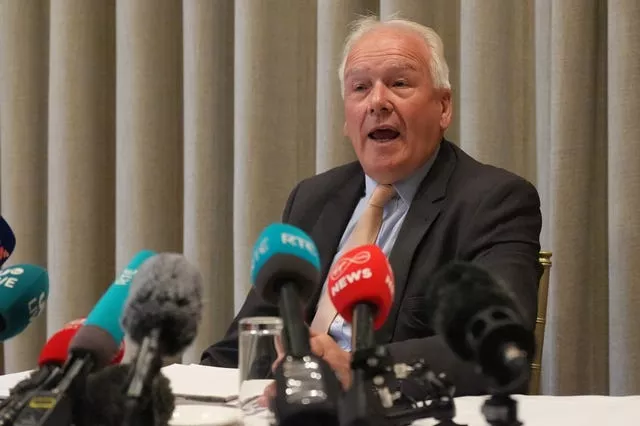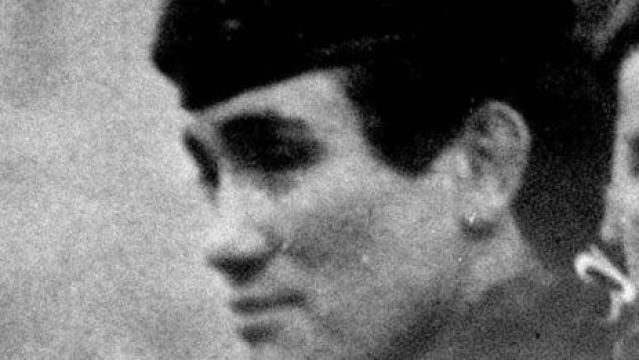A “painstaking” search for the remains of Disappeared soldier Robert Nairac is taking place close to an historical site near the Irish border.
The British Army officer is believed to have been abducted by the Provisional IRA while on an undercover operation in a pub in south Armagh in 1977 and taken across the border to Flurry Bridge in County Louth where he was killed.
The remains of the Grenadier Guards captain have never been found.
Capt Nairac is considered to be part of a group of 16 people, known as the Disappeared, who were killed and secretly buried by paramilitary groups.

It will be the first search for Capt Nairac, and will be carried out by the Independent Commission for the Location of Victims’ Remains (ICLVR), which has located the remains of a number of the Disappeared.
Jon Hill, lead investigator for the ICLVR, said that information about the location of Capt Nairac’s remains had been passed to the commission over the years.
Mr Hill told a press conference on Monday that the commission had reached a point where it believed it had enough credible information to undertake a search.
While investigations got under way on Monday, a geophysical survey of the area has been taking place since the beginning of the year.
“The land is farmland and is on the Hill of Faughart, which some people might know as an old battlefield site,” Mr Hill said.
“That has introduced into our thought processes, and reasoning, a number of factors we have had to take into account. Not least because there will be or may be archaeology there or may be remains that we may come across.
“We have had conversations with National Monument Ireland for advice and support in what we are doing.”
He said archaeologists would assist at the search site.
“Having looked at the mapping, we know that there has been human remains discovered in and around all of that area, particularly when the motorway (M1) was being built,” he added.
He said that the discovery of other remains “isn’t beyond the realms”.
“If there is archaeology that is discovered, if it doesn’t impact where we believe the remains to be, it will be left in place as is the instructions,” the investigator said.

“We should get a good indication as to where Robert Nairac’s remains might be and then we will recover them in the normal fashion.”
Mr Hill said that while Capt Nairac was one of the highest profile of the Disappeared, they had had “very little to go on”.
“In almost every other case, we have (had) engagement with the republican movement, former people who have supported (us) throughout the process to recover all of the disappeared,” he said.
“Unfortunately, they haven’t been able to in relation to Robert Nairac. There are a number of reasons why that might be, because some of the significant people who might have been involved would now be dead.
“It might equally be the case that some people don’t want to talk about it for various reasons, or it may be that people’s memories are fading and their recollection is not as good.”
Mr Hill said that Capt Nairac’s family were aware of the search, which he described as a “lengthy process”.
“The family are aware, and they are philosophical,” he added.
“They are very private people, and they have no wish to make any comment other than they hope Robert can be found and brought home for a Christian burial.”
He said that the search should not last beyond a few months because the ground was stable.
“I’m not 100 per cent confident of finding his remains, but it’s more a case that we are hopeful. We have the skills and ability and the experience to be able to recover his remains if he is there,” Mr Hill added.
The lead investigator also said he was hopeful that the publicity around a television adaptation of a book based on the case of Jean McConville – who was abducted, murdered and secretly buried by the IRA in 1972 – would encourage people to come forward with information.
The ICLVR has also reissued an appeal for information about other remaining Disappeared cases, including Joe Lynskey, Columba McVeigh and Seamus Maguire.
“All information is treated in the strictest confidence,” it said.
The ICLVR can be contacted by telephone on 00353 1 602 8655, by email at secretary@iclvr.ie or by post at ICLVR PO Box 10827.
Crimestoppers can be contacted on 0800 555 111 or the untraceable anonymous online form can be found on crimestoppers-uk.org.







